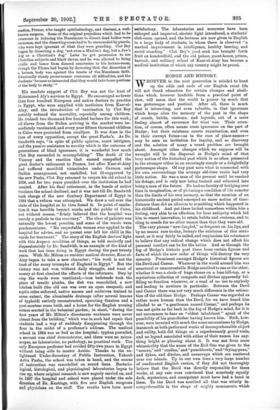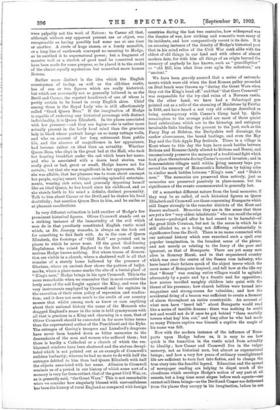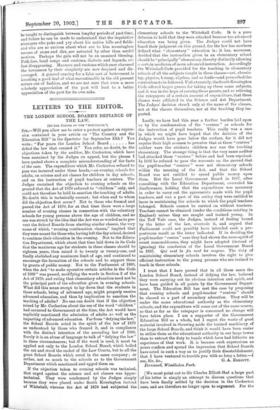HODGE AND HISTORY.
WHOEVER in the next generation is minded to hunt up the odds and ends of our English rural life will not thank education for certain changes and aboli- tions which, however laudable from a practical point of view, will mean that the world is poorer by much that was picturesque and poetical. After all, there is much that is interesting, and even valuable, in that ignorance which keeps alive the memory of the past in the shape of creeds, habits, customs, and legends, out of a mere feeling almost of reverence for what was. Their reten- tion, of course, often means crass ignorance on the part of Hodge ; but their existence courts examination, and even in their corrupt forms—as in the case of place-names— may be seen an invitation for inquiry, and so discovery and the solution of many a vexed problem are brought about. Amongst other changes which we suppose will be wrought will be the dispersal in Hodge's mind of that hazy notion of the historical past which is so often presented to the stranger either in an amusingly simple or a delightfully picturesque shape. Of any past save what is connected with his own surroundings the average old-time rustic had very little notion. He was a man of the present until he reached his dotage, and is only now being trained and educated into being a man of the future. He had no faculty of bridging over time in imagination, or of picturing a condition of life remoter than the limits of his own memory, so that the mention of an historically ancient period conveyed no more notion of time- distance than did an allusion to something which happened in his childhood. And yet there lurked somewhere within him a feeling, very akin to an affection, for hoar antiquity which led him to resent innovation, to retain habits and customs, and to cling to creeds for no other reason than that they were old.
The very phrase " new-fangled," so frequent on his lips, and by no means rare to-day, betrays the existence of this senti- ment, as it may fairly be called, and emphasises his reluctance to believe that any radical change which does not affect his personal comfort can be for the better. And so through the fog of Hodge's historic past there loom certain figures and facts of which the new order of things will destroy the very memory. Prominent amongst Hodge's historical figures are the Devil and Caesar. Whatever in the world around him was unnatural or unaccountable Hodge ascribed to one or the other, whether it was a circle of huge stones on a lone hill-top, or a mysterious collection of ramparts and ditches apparently ful- filling no function whatever, or a road of no use to anybody and leading to nowhere in particular. Between the Devil and Caesar there was not very much difference in the estima- tion of the old-time Hodge. Perhaps Caesar was regarded as rather more human than the Devil, for we have heard him alluded to as "a gentleman named Caesar," and perhaps be was not quite so far back in the fog of Hodge's mind, for it is not uncommon to hear an "oldest inhabitant" speak of the possibility of his grandfather having known him. Both, how- ever, were invested with much the same uncanniness by Hodge, inasmuch as both performed works of incomprehensible object and utility, both did things on a superhumanly grand scale, and no legend associated with either of their names has any- thing bright or pleasing about it. It was not from mere whimsicality that the name of the Evil One was given to the "arrows," and " cradles," and " punchbowls," and" frying-pans," and dykes, and ditches, and causeways which are scattered over our islands. Up to our own time a very large number of uneducated English rustics, if they did not thoroughly believe that the Devil was directly responsible for these works, at any rate were convinced that somebody equally dark, mysterious, and omnipotent must have had a hand in them. To the Devil was ascribed all that was utterly in- comprehensible in the shape of mighty monuments wbieb
'were palpably not the work of Nature: to Caesar all that, although without any apparent present use or object, was recognisable as having possibly had some use at one time or another. A circle of huge stones, or a lonely monolith, or a long line of earthwork conveyed no meaning to Hodge, so he ascribed it to supernatural power; but a fragment of massive wall or a stretch of good road he conceived must have been made for some purpose, so be placed it to the credit of the almost equally mysterious but somewhat more human Roman.
Rather more distinct is the idea which the English countryman of to-day, as well as the old-time rustic, has of one or two figures which are really historical, but which are necessarily not so generally believed in as the Devil and Caesar, the reputed handiwork of one of whom is pretty certain to be found in every English shire. Chief among these is the Royal Lady who is still affectionately called " Good Queen Bess." If the imagination of Hodge is capable of endowing any historical personage with distinct individuality, it is Queen Elizabeth. In the places associated with her presence—and they are legion—she is rather more actually present in the lowly local mind than the gracious lady in black whose portrait hangs on so many cottage walls, and who on account of her long retirement from public life, and the absence of magnificence in her appearance, had become rather an ideal than an actuality. Whether Queen Bess, who slept in the great bed at the Hall, who took her hunting breakfast under the oak which bears her name, and who is associated with a dozen local stories, was really good or bad, great or small, Hodge knows not for certain ; but that she was magnificent in her appearance, that she was affable, that her pleasure was to roam about amongst her people, saying smart things, receiving splendid entertain- ments, wearing rich robes, and generally deporting herself like an ideal Queen, he has heard since his childhood, and so she stands forth in his mind a definite, distinct personality. Talk to him about Caesar or the Devil, and he shakes his head doubtfully; but mention Queen Bess to him, and he smiles as at pleasant recollections.
In very different estimation is held another of Hodge's few prominent historical figures. Oliver Cromwell stands out as a striking instance of the immortality of the evil which men do in that peculiarly constituted English rustic mind which, as Dr. Jeasopp remarks, is always on the look out for something to find fault with. As in the case of Queen Elizabeth, the footsteps of " Old Noll " are pointed out in places to which he never went. Of the great God-fearing Englishman who raised England to the first rank among nations Hodge knows nothing. But where traces of desecra- tion are visible in a church, where a shattered wall is all that remains of a stately home hallowed by the presence of Gloriana, where an ancient door shows the pattern of bullet- marks, where a place-name marks the site of a burial-place of "King's men," Hodge brings in his ogre Cromwell. This is the more remarkable when we remember that in most counties the lowly sons of the soil fought against the King, and were the very instruments employed by Cromwell and his captains in the execution of their stern policy of repression and eradica- tion; and it does not seem much to the credit of our country masses that whilst among such as know or care anything about their national history the name of the Monarch who dragged England's name in the mire is held synonymous with all that is gracious in a King and charming in a man, that of Oliver Cromwell should be execrated in far more bitter terms than the supernatural author of the Punchbowl and the Dyke. The outrages of Goring's troopers and Lunsford's dragoons have never been banded down as bitter memories to the descendants of the men and women who suffered them ; but there is hardly a Cathedral or a church of which the em- blazoned windows have been shattered and the statues decapi- tated which is not pointed out as an example of Cromwell's ruthless barbarity; whereas he had no more to do with half the outrages debited to him than bad Queen Elizabeth with half the objects associated with her name. Allusion to Cromwell reminds us of a period in our history of which some sort of a memory is very far from extinct, that of the great Civil War, or, as is generally said, "the Great Wars." This is not remarkable when we consider how singularly blessed with uneventfulness has been the history of rural England as compared with foreign
countries during the last two centuries, how widespread was the theatre of war, how striking and romantic were many of its incidents, and how comparatively recent is its date. It is an amusing instance of the density of Hodge's historical past that in his mind relics of the Civil War rank alike with the oldest of old things in our land and with others of almost modern date, for with him all things of an origin beyond the memory of anybody he has known, such as " grandfeyther " or " old Bill, him what lives over ag'in the milestone," are " ancient."
We have been gravely assured that a series of entrench. meats which were old when the first Roman galley grounded on Deal beach were thrown up " during the Great Wars when they cut the King's head off," and that " that there Cromwell" was responsible for the ivy-clad ruins of a Norman castle. On the other hand, we have had a Sebastopol gun pointed out as a relic of the storming of Maidstone by Fairfax in 1648, and have heard a not very old cottage described as being contemporary with Caesar's Camp hard by. Quite meaningless to the average yokel are most of those quaint local celebrations which are to the historian and antiquary invaluable links binding the present to the past, such as the Furry Day at Helston, the Derbyshire well dressings, the curfew observances, the bound beatings, and even the May Day and the Oak-Apple Day festivals. There is a village in Kent where to this day the boys have mock battles between Britons and Romans (lately altered to Britons and Boers), and unconsciously preserve the memory of a traditional fight which took place thereabouts during Caesar's second invasion; and in Somersetshire villages until within living memory boys pre. served the memory of Monmouth's Rebellion by taking sides in similar mock battles between " King's men" and "Duke's men." The memories are preserved thus actively, just as memories are preserved passively in place-names, but the significance of the events commemorated is generally lost.
Of a somewhat different nature from the local memories, if they may be so called, of such historical figures as Queen Elizabeth and Cromwell are those concerning Bonaparte which still linger strongly in the remoter districts of the Kent and Sussex seaboard. Memories they are in the sense that there are yet a few " very oldest inhabitants " who can recall the reign of terror—prolonged after he had ceased to be harmful—of the great little Corsican, but not in the sense in which he is still alluded to, as a being not differing substantially in significance from the Devil. There is no name connected with our national history which ever exercised such a spell over popular imagination, in the broadest sense of the phrase, and not merely as relating to the fancy of the poor and ignorant, as that of Bonaparte. There are yet many men alive in Romney Marsh, and in that sequestered country which was once the centre of the Sussex iron industry, who have heard their fathers speak of the abject terror which the mere name of Bonaparte inspired, and tell how at the idle cry that " Boney " was coming entire villages would be agitated alternately by a panic and by a frantic zeal for opposition ; how nurses terrified naughty children into quiet with the threat of his presence; how church belfries were turned into magazines and strong-rooms for valuables ; and how the accidental firing of a beacon was sufficient to create a ferment of alarm throughout an entire countryside. An account of what men have " heerd tell" about Bonaparte would read like a series of terrible dreams : there was nothing he could not and would not do if once he got behind " them martelly towers what kep' him out," and long after he who had made so many Princes captive was himself a captive the magic of his name was felt.
Now with the modern instance of the influence of Bona- parte upon Hodge before us, it is easy to see how quick is the transition in the rustic mind from actuality to ideality ; how Caesar and Cromwell live in the vulgar memory, not as historical men, but almost as supernatural beings ; and how a very few years of ordinary unenlightened life are sufficient to turn fact into fiction, and to change the true story into the fanciful legend. Education and the spread of newspaper reading are helping to dispel much of the cloudiness which envelops Hodge's notion of any past at all remote, but a long time must elapse before such agents—one cannot call them beings—as the Devil and Caesar are dethroned from the places they occupy in his imagination, before he can
be taught to distinguish between lengthy periods of past time, and before he can be made to understand that the inquisitive strangers who poke and pry about his native hills and fields, and who are so curious about what are to him meaningless masses of stone and dirt, are actuated by other than sordid motives. Perhaps the gain will not be an unmixed blessing. Folk-lore, local songs and customs, dialects and legends, are fast disappearing. Manners and customs which once charmed the townsman by their simplicity are now despised and dis- couraged. A general craving for• a false sort of betterment is knocking a good deal of what was estimable in the old peasant nature out of fashion, and we are not sure that even a more scholarly appreciation of the past will lead to a better• appreciation of the past for its own sake.








































 Previous page
Previous page